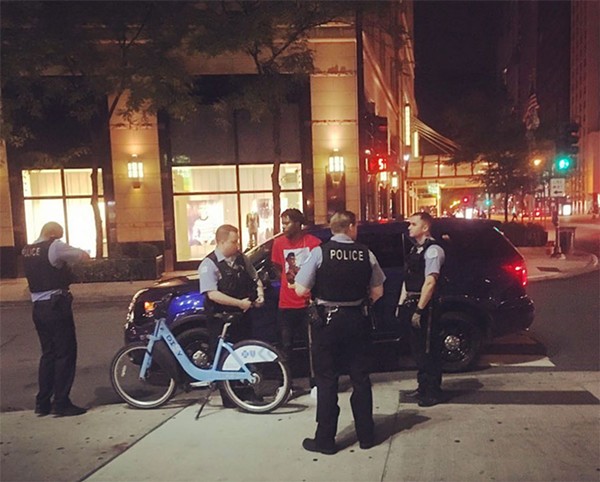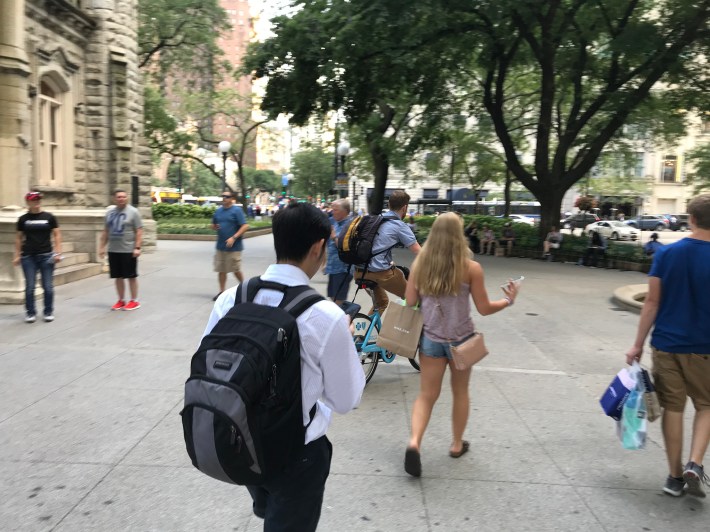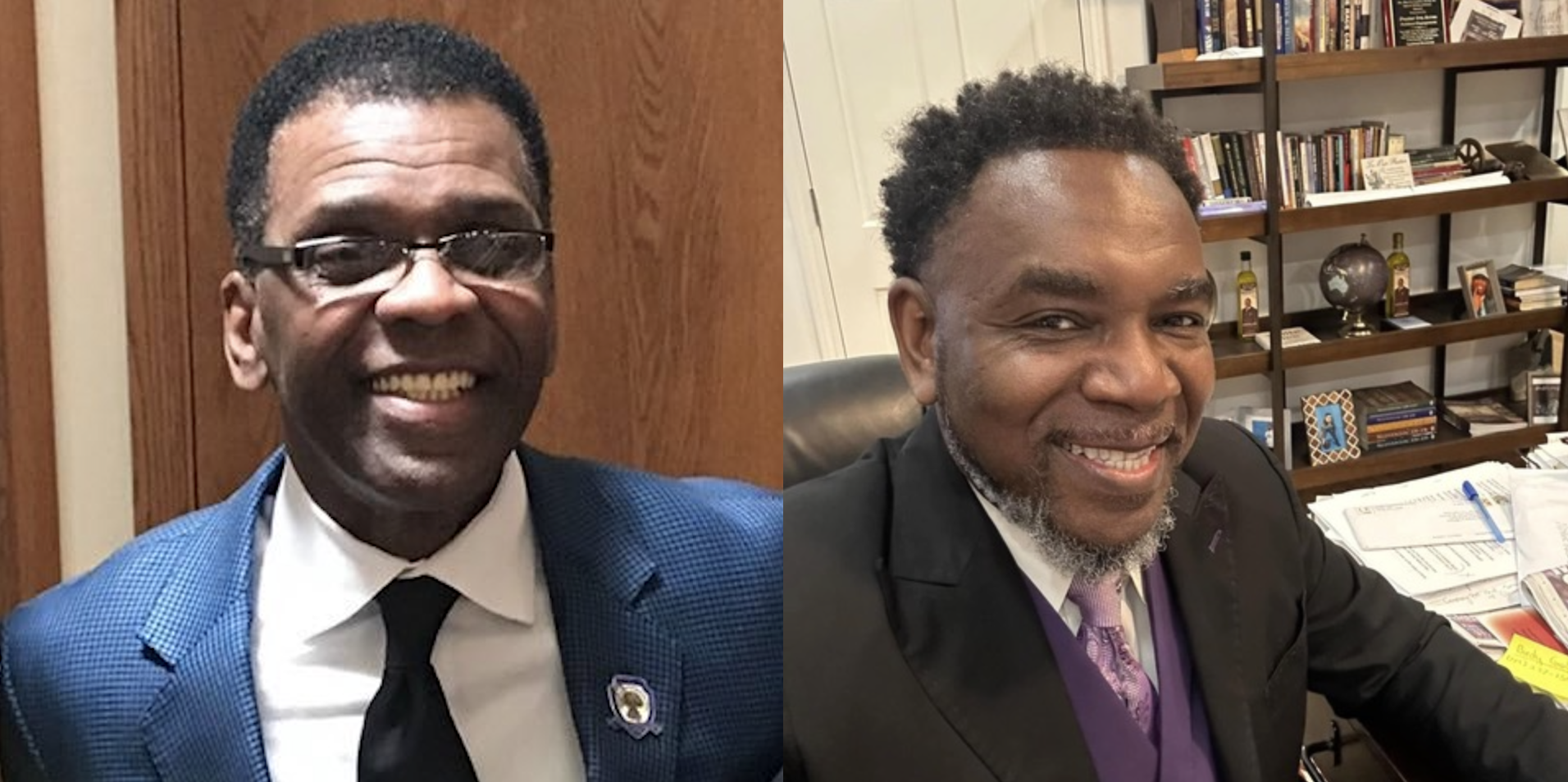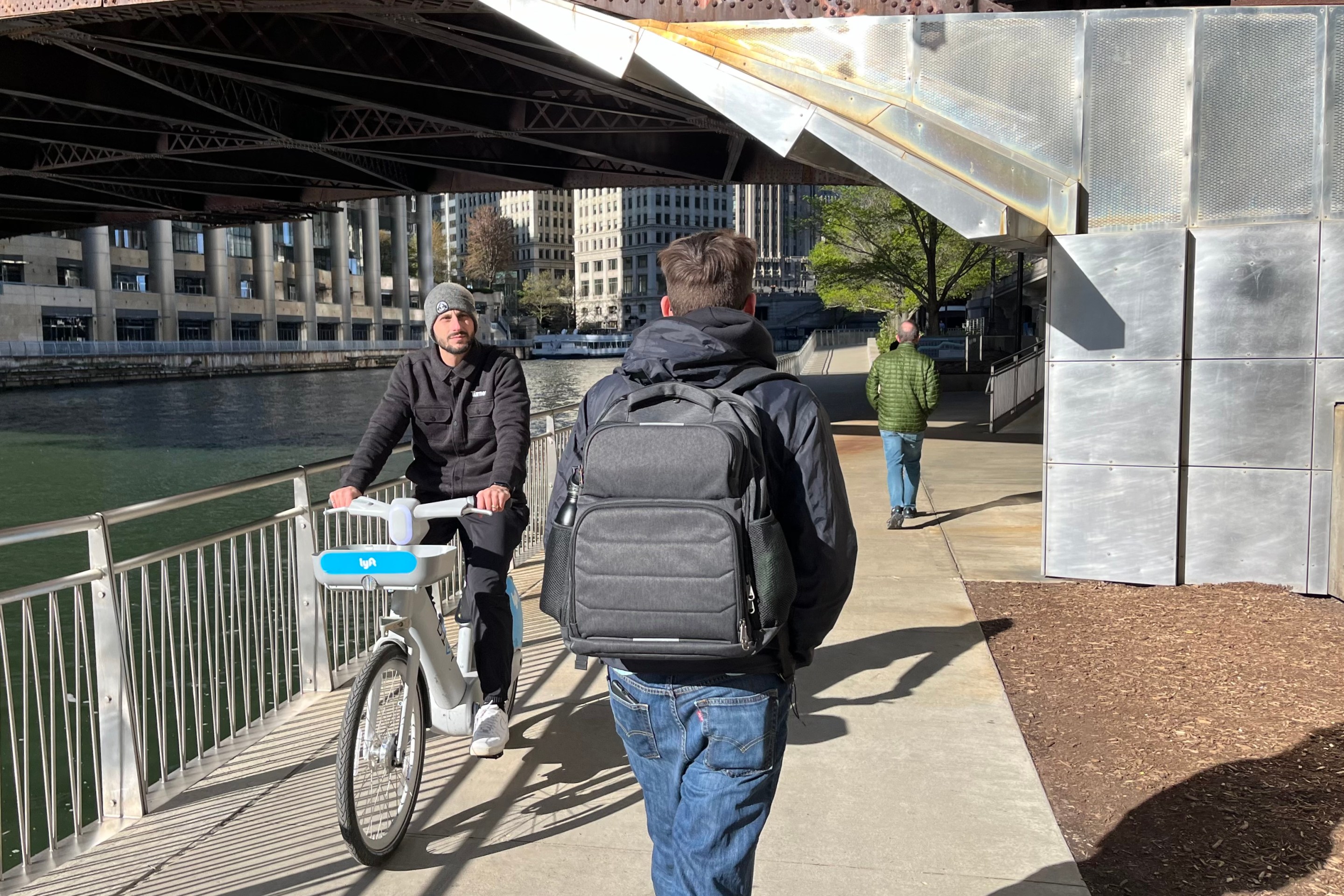Is CPD Using Racial Profiling to Catch Divvy Thieves?
12:12 PM CST on February 21, 2019

Police arrest Divvy rider Joshua Thomas last August. Photo: Eboni Senai Hawkins
[This previously ran in the Chicago Reader.]
On the evening of August 18 last year, Eboni Senai Hawkins, cofounder of Chicago's chapter of the black bicycle group Red Bike and Green, witnessed Joshua Thomas, a 22-year-old African-American, being stopped by police while riding a Divvy bike-share cycle on the sidewalk near Chicago Avenue and Rush Street. The officers handcuffed and frisked Thomas, called in the serial number on the baby-blue bike, and discovered it was stolen. They arrested Thomas, who was later sentenced to two days in jail.
During the height of that summer's Divvy theft crisis, Senai Hawkins argued that police were targeting young black men for sidewalk-riding tickets as a strategy to recover hot bikes. She noted that people of all races pedal on sidewalks downtown, where hectic multilane streets put cyclists at risk, but she asserted that white sidewalk riders are rarely ticketed, let alone handcuffed and searched. "In no way is it OK for the Chicago police to enforce [a crackdown due to] the fact that Divvy has a technology issue."
Soon afterward I spoke with black Old Town resident Hakeem Appling, 24, who was also riding a Divvy on the sidewalk near Chicago and Rush on July 18 when he was detained, cuffed, frisked, ticketed, and arrested for possession of a stolen bike. Appling argued that his skin color was a factor in the stop. "That's harassment."
Catrina Hampton, 23, a vehicle transporter for Hertz, was yet another African-American who was ticketed for sidewalk biking on a Divvy near Chicago and Rush on August 9. She said she was handcuffed and searched, but the police didn't call in the number on her Divvy.
All told, 23 of the 30 adults ticketed for sidewalk riding in the two downtown police districts during July and August of last year were African-American, including 20 black men, according to records the city provided earlier this month. That's about 77 percent of the ticket recipients in a city that's roughly a third African-American.
Meanwhile only five non-Hispanic whites were ticketed. That's approximately 17 percent of recipients, although whites also make up about a third of the city. (Of the other two people ticketed, one was Asian, while the other had no race listed on his ticket.)
Romanian immigrant Samuel Baltes, 21, was one of only two white men ticketed. On July 20, Baltes was biking down the sidewalk of Chicago near Rush on his old beater while making food deliveries for Postmates. Suddenly a squad car whipped around the corner to block his path. He said the officers wrote him a $50 ticket but he wasn't cuffed or frisked.
Upward of 500 Divvies went missing last summer due to the shortsighted decision to remove a key piece of security hardware from their docks, according to city e-mails the Reader obtained in September. Soon afterward Divvy sped up the pace of reinstallation, wrapping up by the end of November, and, thankfully, the bike-share problem seems to be behind us.
Arrests for possession of stolen Divvies peaked in July and August, when more than 120 adults were charged citywide, according to the anonymous crime blog CWB Chicago. Of the 30 people ticketed for sidewalk riding downtown in those months, eight were arrested for possession of stolen bikes—all of them African-Americans on Divvies.
The CPD says it has used sidewalk biking enforcement to recover stolen cycles.
But after learning that 23 out of those 30 people were African-American, Senai Hawkins and other black bike advocates say the data confirms their suspicions: police have been unfairly singling out African-Americans who cycle downtown for tickets. "How else would you interpret it?" she asked.

David Griggs, who leads the monthly South Side Critical Mass bike rides, noted that the Chicago Tribune found that officers have written exponentially higher numbers of sidewalk-riding citations in some communities of color. Last summer a CPD representative admitted that this was due to bike enforcement being used as a pretext for searches in high-crime areas.
After seeing the downtown ticketing numbers, Griggs said, "It's disheartening to know police are targeting black riders wherever they may ride, not just on the south and west sides."
However, after I reported on the Appling and Thomas cases on Streetsblog last summer, CWB Chicago ran a post arguing that racial bias wasn't a factor in those stops. It pointed out that the area around the Chicago Avenue Red Line station is designated as a crime hot spot by the CPD, so it has a 24/7 police presence.
A CPD representative confirmed this area is heavily policed due to numerous assault cases last year. Most recently, on December 9, a group of teens attacked three bystanders on the el platform, fracturing one man's eye socket. Eight of the 30 ticketing incidents, including half of the arrests, occurred within this zone. CWB also noted that Appling and Thomas had each been arrested several times in the area for various offenses.
Prior arrest histories may have informed officers' decisions to stop some of the other 28 downtown sidewalk riders. But that doesn't necessarily explain why the cyclists who were ticketed, but not arrested, were still three times as likely to be black than white.
That ratio looks even worse when you consider that three of the five whites—all women—ticketed were caught in the same questionable bike dragnet on July 13 on the wide east sidewalk of the 100 block of North Michigan Avenue.
Five tickets were issued there between 5:27 and 6 PM in what CPD spokesman Howard Ludwig confirmed was a targeted enforcement event. “Keeping . . . cyclists in designated bike lanes is an important measure of protecting the safety of all citizens,” he said. However, there was no bike lane on Michigan at the time, although the Chicago Department of Transportation installed one in late July. One of the three white women cited told me she wasn’t cuffed or frisked.
Ludwig asserted that racial profiling didn't play a role in decisions on whom to stop last summer, because officers had legitimate reasons to suspect some of the African-Americans who were ticketed had stolen bikes. "The CPD issues citations for riding on the sidewalk . . . without regard to race," he said. "Reasonable suspicion is required ahead of any investigatory stop."
"During the period of increased Divvy thefts last summer, officers were under guidance to be on the lookout for Divvy bikes with bent or broken spokes, which is an indicator that the bike had been [pried from the docks]," Ludwig added. However, it's highly unlikely that a police officer would be able to spot faulty spokes on the spinning wheels of a moving Divvy.
CDOT, which oversees Divvy and may have provided that guidance, declined to comment.
Karen Sheley, director of ACLU of Illinois's police practices project, told me the lopsided downtown bike enforcement numbers do indicate a racial equity problem. "Looking at this relatively small sample, the racial disparities reflect the disparities we've been concerned about in other, larger data sets for years, including driver and pedestrian stops across the city," she said. "We also have to question whether enforcing low-level infractions as part of a broken-windows policy is really what the CPD should be doing right now. And if they are, that should be part of the public debate."
Update: Following publication of this article, CPD spokesman Howard Ludwig confirmed that Hampton was arrested.
In addition to editing Streetsblog Chicago, John writes about transportation and other topics for additional local publications. A Chicagoan since 1989, he enjoys exploring the city on foot, bike, bus, and 'L' train.
Stay in touch
Sign up for our free newsletter
More from Streetsblog Chicago
Johnson appoints one West Side pastor to CTA board, then nominates another West Side pastor for RTA board
Supporters argue that, despite his lack of transit expertise, Ira Acree’s social justice experience and political connections could be an asset for the RTA board.
Today’s Headlines for Thursday, April 26
The de-facto ban on riverwalk biking is back. What should we do about it?
In the short term, new signage is needed to designate legal areas for cycling on the path. In the long term CDOT should build the proposed Wacker Drive protected bike lane.


